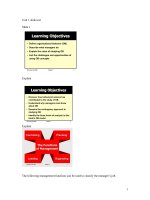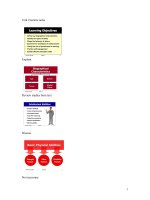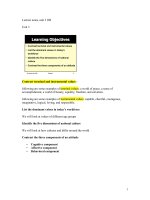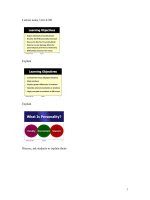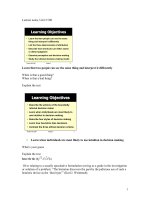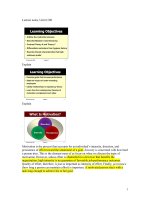Organizational behavior: Lecture 45 - Dr. Mukhtar Ahmed
Bạn đang xem bản rút gọn của tài liệu. Xem và tải ngay bản đầy đủ của tài liệu tại đây (649.39 KB, 55 trang )
Organizational
Behavior
(MGT-502)
Lecture-45
Today’s Topics
OB………
IN A
GLANCE
In OB, everything
depends. . .
But you need to know
on what !
Organizational
Behavior
Organizational Behavior
. . . a field of study that
investigates the impact that
individuals, groups and structure
have on behavior within
organizations, for the purpose of
applying such knowledge toward
improving an organization’s
effectiveness.
Forces reshaping
the process of
management
Power of Human
Resources
Cultural Diversity
Globalization
EmployerEmployee
Rapid
Change
New Psychological
Contract
Organizational Behavior
The study of individual behavior and group
dynamics in organizational settings
Performance appraisal Work design
Human Behavior
Organizational Structure
Jobs
Organizational Design
Organizational Variables
Behavior is a function
of both the Person
and the Environment.
B = f (P/E)
Understand
organizational
events
Influence
organizational
events
Organizational
Behavior
Research
Predict
organizational
events
OB
Systematic study of how
people behave in
organizations
What is an Organization?
A structured social system
consisting of groups and
individuals working together to
meet some agreed-upon
objectives.
Entrepreneurial
Collective
Formalization
Time
Elaboration
Stages in the Organizational
Life Cycle
1) Entrepreneurial: The creation stage of an organization;
founder managers do most jobs, work long hours, set the
climate of the organization
2) Collective: The organization begins to take shape; division of
labour occurs; control, responsibilities & levels of autonomy are
established
3) Formalization: Formal roles become established; strategic
& operational concerns are differentiated; co-ordination &
control become desired goals
4) Elaboration: The stage of renewal which follows the
increasing rigidity of the formalization stage
Organizational Strategy
Mission
What we are or want to be?
Specific Goals
What must be achieved? When?
Strategy
What will we do to get there?
Basic OB Model
Organization
systems level
Group
level
Individual
level
Variables
Influencing
Individual Behavior
The Person
• Skills & abilities
• Personality
• Perceptions
• Attitudes
•Values
• Ethics
The Environment
• Organization
• Work group
• Job
• Personal life
Behavior
B = f(P,E)
Behavior
Motivation
Perceptions
Attitudes
Values
Individual Level Factors
• Values, Attitudes
• Personality & Emotions
• Ability
• Perception
• Attribution
• Motivation
Group & Interpersonal
Factors
• Group Structure
• Team Characteristics & Development
• Leadership
• Conflict
• Power & Politics
Organizational Factors
• Organization Structure
• Work Design
• Organization Culture
What is Organizational
Behavior?
• Refers to the attitudes and behaviours
of individuals and groups in
organizations.
• Studies how organizations can be
structured more effectively and how
events in their external environments
affect organizations.
Why Study
Organizational Behavior?
• It is interesting because it is about people
and human nature.
– Includes interesting examples of success and
failure.
– Provides tools to find out why people behave
the way they do.

